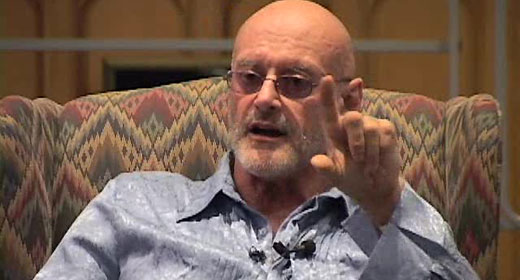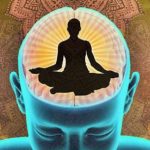by Greg Johnson: Does it Matter? is one of my favorite Alan Watts books, to which I have returned again and again.
It is also an excellent introduction to Watts’ work. Thus I was delighted to discover that, at long last, it has been reprinted, hence this review.
The theme of Does it Matter? is material existence. The book begins with five long essays. “Wealth versus Money” deals with economics; “Murder in the Kitchen” deals with ecology and home design as well as cooking. (Both were originally published in Playboy.) “Clothes—On and Off,” “The Spirit of Violence and the Matter of Peace,” and “Psychedelics and Religious Experience” have self-explanatory titles.
Images of Gandhi’s hunger strikes, skeletal yogis in dirty dishrags, and onion-headed monks with begging bowls (not to mention the occasional kerosene and zippo self-immolation) have fostered the impression that Eastern philosophy and religion are entirely “spiritual” and world-denying. Similarly, images of the America’s sprawling cities, bustling superhighways, luxurious homes, and consumerist cornucopias have fostered the impression that our civilization is materialistic and this-worldly.
Watts argues, however, that in some respects the opposite is actually true.
For instance, Watts claims that if Americans were true materialists, we would not build such ugly cities and eat such beastly food. He argues that the ugliness of urban America and the insipidness of the typical diet are actually expressions of a kind of Gnostic or Cartesian dualism, a spiritualistic discomfort with the material world that leads to a crude, unrefined materialism that prizes quantity over quality. Watts argues that the French are more genuinely materialistic than Americans, which is why French cities are more beautiful and French food is so superior. I think this is brilliantly insightful, and there is something like it on every page—indeed in every paragraph—of Does it Matter?
Watts also argues that Eastern philosophy and religion are not necessarily spiritual and world denying. For instance, the non-dualistic interpretation of Vedanta (the philosophy of the Upanishads) implies a kind of pantheism. The divine is identical with the material universe and with each individual being. The goal of religion is the mystical experience of our oneness with the divine/cosmos. This experience may require asceticism and contemplation. But it can just as well be spontaneous and effortless. It can hit you in the marketplace, on the battlefield, or in your turnip patch.
Mahayana Buddhism, moreover, stresses the unity of samsara and nirvana. Nirvana is not blissful annihilation, but a change of attitude in this life that allows freedom and detachment in the whirl and rush of material existence.
Such philosophies foster attitudes of freedom, detachment, and aesthetic playfulness in relation to material existence. They are conducive to artistic creativity and the refinement of taste.
“Wealth versus Money” proposes a utopian economy. Wouldn’t it be lovely, Watts asks, if machines put us all out of work? Watts envisions a Star Trek economy where high technology and cheap energy abolish scarcity and the money economy, providing free sustenance for all. Would everybody go hog wild accumulating things? Well, what would be the point of that? People hoard only when there is scarcity, and scarcity is precisely what is being abolished. Would people vegetate? What would be the point of that, given that people vegetate only between bouts of work, and work is being abolished?
Watts argues that instead, people would adopt lives of material simplicity and that a new economy would emerge to occupy people’s leisure. Since any quantity of manufactured goods would be free, people would value quality and uniqueness. This would give rise to a new appreciation of craftsmanship. Old and unique objects would be highly prized and new and unique objects would be created. Art, craft, literature, and scholarship would flourish. So would games and sports. Tastes would be increasingly refined and exquisite. Life would be playful, ritualistic, and beautiful.
Watts does not mention it, but such a society would benefit from a gentle program of eugenic selection that would decrease the representation in each further generation of people who could not benefit from or contribute to such a society—people whose idle hands would be occupied solely with the Devil’s work.
To most readers, the theory of “Wealth versus Money” seems both amazingly original and astonishingly naïve. But that is because Watts is concealing his sources. In fact, the foundation of his proposals is merely a version of C. H. Douglas’ Social Credit theory. Of course Watts had good reason not to mention Douglas in the pages of Playboy in 1968: Social Credit was the economic system favored by Anglophone fascists like Ezra Pound. Watts was known to be a quiet man of the Right, but it is high time that scholars determine just how far to the Right he was. Watts tries to reach out to the ’60s counter-culture in Does it Matter?, but at the same time he makes it clear that he accepts the Traditional idea of historical decline and rejects all cause-mongering and progressivism.
“Murder in the Kitchen” is really an essay about Deep Ecology, about man’s embeddedness in—our oneness with—nature and what this implies for daily life, from the food we eat to the houses we inhabit. Watts also deftly shows the connection between Western Gnostic and Cartesian mind-body dualism and such phenomena as Velveeta, Wonder bread, and Tang; factory farms; drab, clinical kitchens; air conditioned hells (of the stationary and wheeled varieties); and suburban sprawl.
One of Watts’ most surprising and refreshing positions is his critique of vegetarianism. For Watts, vegetarianism is simply an attempt to evade the fact that life feeds on life, that the universe is a vast web of creation and destruction. A vegetarian is just a person who spares his own feelings by killing creatures that can’t scream. Vegetarianism is an attempt to remove man from nature, rather than to embrace nature and plunge into it. As such, vegetarianism can be part of an ascetic retreat from life. But Watts will have none of that.
Once we own up to the fact that we live by killing, we should make sure that we do not kill needlessly or cruelly. Beyond that, it is far more important to insure animals have good lives rather than merely good deaths.[1] This means no more factory farms and feedlots and milk-fed calves. Furthermore, an animal that is badly cooked has died in vain. Finally, the place where we properly honor the creatures upon which we feed is a well-appointed kitchen, a kitchen that expresses a full commitment to the refinement and perfection of material existence.
Watts’ descriptions of ideal kitchens, living spaces, and foods—and their typical American antipodes—are vivid and charming. His description of modern bread is genuinely hilarious. (It is clear that there has been a lot of real progress on the food front since the late ’60s.) Yes, there is much personal opinion here—unapologetically offered as such—but there is much truth, goodness, and beauty too.
Watts’ essay on clothes is less successful. He has a prejudice against Western clothing, particularly British, and a penchant for Oriental dhotis, sarongs, and kimonos, and instead of owning up to his preferences, he tries to deduce them (rather implausibly) from Vedanta. But if the cosmos is the gods at play, trying on every possible mask, acting out every possible scenario, then Chanel is as legitimate as a sari, a Prussian uniform as legitimate as Samurai armor, a corset as legitimate as a lotus foot (and far less destructive).
Western clothes, Watts says, are uncomfortable, which only proves he did not know his correct size or a good tailor. Properly fitted and seasonally appropriate Western clothes are as comfortable as any Asiatic loincloth and usually far more flattering. (But I will admit that I have a prejudice for the English look.)
Besides, comfort is so “bourgeois,” ruled by the realm of necessity. Fashion is the realm of freedom. It is always better to look good than to feel good. And that is where the true gist of Watts’ argument points. Watts offers a defense of dandyism as a rebellion against modern democratic leveling and conformism, as well as uptight and aggressive relations to one another and the natural world. He might also add Puritanical Gnosticism. There is no reason why the playful and refined embrace of material existence should not allow some room for male vanity. “Human beings the whole world over need to relax, become gentlemen, take themselves lightly, and ‘come off it.’ Easy, gracious, and colorful clothing might well be a beginning” (p. 68). But Watts also needs to “come off it” and admit that military uniforms, along with priestly vestments, are one of the great Western bastions of dandyism.
Which bring us to the next essay, “The Spirit of War and the Matter of Peace,” which blames war on dualistic alienation from the material world. This may be true of wars fought by alienated dualists, but it certainly does not capture the essence of all war. Historically, most wars have not been fought over ideologies at all, much less metaphysical dualism, but over honor and gain. Thus Watts tends to gross oversimplification. Moreover, he has a clear prejudice against war, which is at variance with Hindu tradition, which regards war as one of the darker games the gods play, and as such a necessary part of the whole which must be affirmed, indeed sacralized, and carried out as a solemn duty of the warrior caste.
Watts’ essay “Psychedelics and Religious Experience” is superb. Dualists like R. C. Zaehner cannot grasp how a material substance like a psychedelic drug can be the basis of a genuinely “spiritual”—i.e., mystical—experience.[2] But pantheism—which is essentially how Watts interprets Vedanta, Buddhism, and Taoism—rejects such dualism and understands the mystical problem as overcoming a false consciousness of ourselves as isolated, mortal, suffering individuals. Dualism adds another layer to this false consciousness by insisting that we are cut off from the divine because of our material embodiment. The truth is that we are one with the active, eternal energy of the cosmos because our body is part of the body of the cosmos, which is divine.
The mind is as material as the cosmos. The cosmos is as spiritual as the mind. Thus there is no metaphysical difference whether we attain cosmic consciousness at the end of a long ascetic and meditative approach—or spontaneously and instantaneously (so-called “instant Zen”) triggered by a random event: looking at a bee gathering pollen or the gleam in a pewter vessel—or chemically, through mescaline or LSD. The use of psychedelics is usually likened to instant Zen because of its relative effortlessness, but it is also analogous to asceticism, because it is a deliberate, self-initiated transformation of consciousness, rather than something random and triggered by external conditions.
Watts’ descriptions of his psychedelic experiences are fascinating: “I was amazed and somewhat embarrassed to find myself going through states of consciousness which corresponded precisely with every description of major mystical experiences I had ever read. Furthermore, they exceeded both in depth and in a peculiar quality of unexpectedness the three ‘natural and spontaneous’ experiences of this kind which I had had in previous years” (p. 81).
Watts describes four traits of psychedelic experience that precisely correspond to mystical experiences. (They correspond, of course, because they are the same.) First, time seems to slow down and the present seems to expand. Second, one rises above opposites, realizing that they are just polarities in an underlying unity. Self and other, good and evil, God and the devil, all seem one, and there is an affirmation of the whole—an experience of identification with it—that lies beyond all distinctions of good and evil. Third, there is an experience of the identity of all selves with a cosmic all-self, as well as a sense that all the lights of consciousness that flicker on and off, all the little worlds that expand and collapse, are manifestations and “masks” of this all-self. Fourth, there is the experience of the identity of the self with the eternal energy of the cosmos. One no longer sees oneself as a finite being who merely suffers, but as one with the infinite, active energy of the cosmos. Here the fear of death ceases, for although the individual ego suffers and dies, the true self is eternally active and creative. And isn’t the fear of death the main reason why people never really live fully actualized lives in this world?
Does it Matter? concludes with seven small, jewel-like essays, each a few pages long, dealing with religion, art, Aldous Huxley, and D. T. Suzuki. In “The Basic Myth,” Watts encapsulates Indian religion and philosophy in four pages.
Alan Watts is an obligatory thinker for those who would combine Traditionalist spirituality, aesthetic attunement, and world-embracing power. Does it Matter? is not just the perfect introduction to Watts’ philosophy. It is also a great introduction to philosophy as such, for everyone who first comes to philosophy wonders “Does it matter? Does it matter at all? Does it matter to me?” Watts shows that the answer to all these questions is a resounding “Yes!”







































